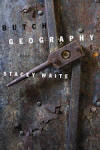Butch Geography
As soon as I saw the title of Stacey Waite’s first full-length book, Butch Geography, I was reminded of a line from the poem “Solar” by Robin Becker: “The desert is butch.” Unsurprisingly, Waite uses this line as an epigraph for the book’s title poem. However, while Becker’s poem focuses largely on the geography of landscape, Waite’s book concerns itself prominently with the intimate geography of the gendered body and its relationship to the world and to others.
As soon as I saw the title of Stacey Waite’s first full-length book, Butch Geography, I was reminded of a line from the poem “Solar” by Robin Becker: “The desert is butch.” Unsurprisingly, Waite uses this line as an epigraph for the book’s title poem. However, while Becker’s poem focuses largely on the geography of landscape, Waite’s book concerns itself prominently with the intimate geography of the gendered body and its relationship to the world and to others.
Gender is more than just a topic of the collection; in six poems spread throughout the book’s four sections, gender functions as a character, the “you” addressed by the poem. The first of these six “Dear Gender” poems concludes:
Gender, rise out, an exorcism, from our too-scared skin
. . . . . . . . . . . . . . . . . . . . . . . . . . . . . . . . . . . . . . . . .
Here I am, gender. Tell me again the girl I should be,
please, just say it quietly, so no one will hear.
Throughout the book, gender is addressed, assumed, pretended, challenged, and questioned with touching honesty and thoughtful reflection.
Most of the book is very personal; many poems begin with specific experiences or relationships, including the speaker’s relationship with her parents. The parental relationship is fraught from the beginning of the book: “Self-Portrait, 1984,” for example, states: “Dad tells Mom I’ll end up a dyke / from playing ice hockey.” Later, in “When the Dead Ask for Maps,” the speaker says: “My father’s dead voice / wants me to say I am a woman.” The pressure to conform to an expected gender and sexual identity comes from both parents, but it feels more sympathetic from the speaker’s mother. In “Coming Out in Porch Light,” the speaker tells her mother she’s in love with a woman. At first, the mother doesn’t react, which does not seem surprising: “In this family, / we pretend not to notice.” But after the mother goes to bed, the speaker offers an explanation for her silence which I found immensely affecting:
her mind flush full with pastors
who pray hate for the damned . . .
She thinks of men who shove bodies
against walls at gas stations . . .
She imagines
a busted lip on my boyish face.
The fear of violence and judgment characterizes the speaker as well as her mother, especially in the poems about childhood and youthful experiences. It is only as the speaker grows older that she is able to boldly assert: “I am after, I am post, post-feminist, / post-structuralist, postpartum, post-lesbian, / post-gender.” In this poem, both angry and playful in its use of language, the speaker continues: “I am posting up a sign and it says, / ‘Stand back,’ cause not every move I make / is the move of a woman.” This confidence is hard-won and inconsistent, but its presence illuminates the book.
One final way in which the theme of gender shapes the book is the inclusion of several poems that take their titles from moments of mistaken identity. The book begins with “On the Occasion of Being Mistaken for a Boy by the Umpire in the Little League Championship” and includes several other poems based on those gender mistakes. But even if the titles begin the same way, the poems stand independently, and each one offers something different, a different part of the complex story of gender over the course of the speaker’s life. In the last of these mistaken identity poems, “On the Occasion of Being Mistaken for a Woman by a Therapist in the South Hills of Pittsburgh,” Waite changes the format. In this poem, it’s not the assumption of masculinity that’s the error, but of femininity. “It feels wrong to be a woman,” the speaker says, an idea that’s appeared previously. The poem continues:
. . . I do not speak
the language of women, and the therapist
is trying to unwind me. She thinks, of course,
that I must know what it is like, that
somewhere deep inside me lives the life
of a woman, if only I would let her speak.
Although gender is never simple in Waite’s book, this inclination to let it speak, in all of its various incarnations, gives the book a great strength and relevance. Clear language makes the poems accessible (a word I use in the most positive sense), and a fluid motion between past and present, between masculine and feminine, makes them complex. All told, Waite has put together a valuable, fascinating, and beautiful first book.





